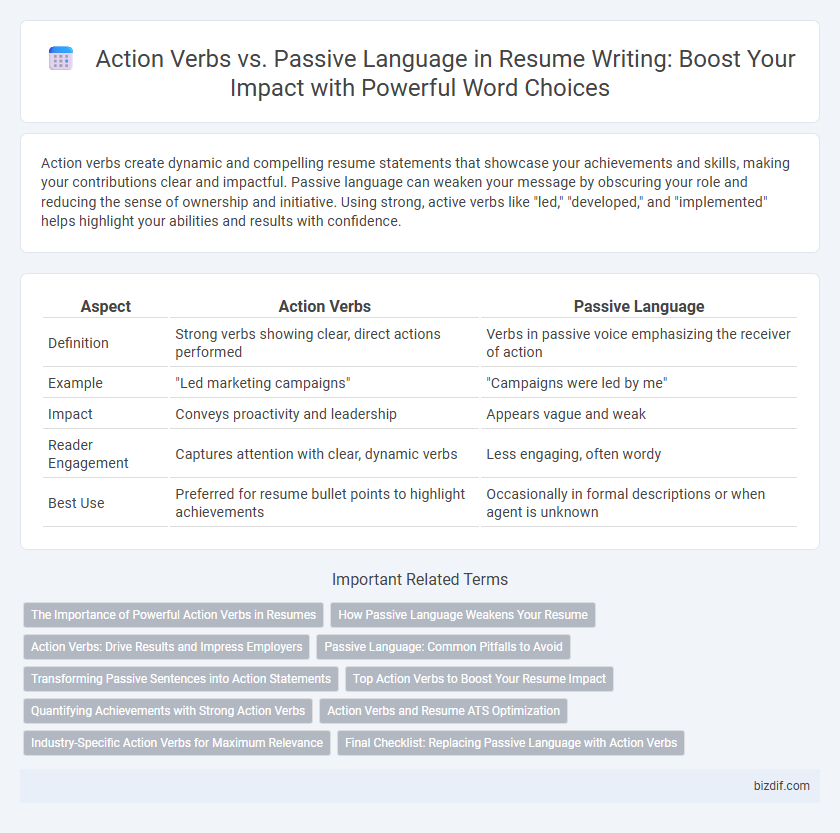Action verbs create dynamic and compelling resume statements that showcase your achievements and skills, making your contributions clear and impactful. Passive language can weaken your message by obscuring your role and reducing the sense of ownership and initiative. Using strong, active verbs like "led," "developed," and "implemented" helps highlight your abilities and results with confidence.
Table of Comparison
| Aspect | Action Verbs | Passive Language |
|---|---|---|
| Definition | Strong verbs showing clear, direct actions performed | Verbs in passive voice emphasizing the receiver of action |
| Example | "Led marketing campaigns" | "Campaigns were led by me" |
| Impact | Conveys proactivity and leadership | Appears vague and weak |
| Reader Engagement | Captures attention with clear, dynamic verbs | Less engaging, often wordy |
| Best Use | Preferred for resume bullet points to highlight achievements | Occasionally in formal descriptions or when agent is unknown |
The Importance of Powerful Action Verbs in Resumes
Powerful action verbs like "led," "implemented," and "achieved" enhance resume effectiveness by clearly demonstrating accomplishments and proactive contributions. Using active language increases resume impact, making responsibilities and achievements more dynamic and measurable to hiring managers. Avoiding passive phrases such as "was responsible for" ensures stronger, concise communication that highlights initiative and results.
How Passive Language Weakens Your Resume
Using passive language in resumes diminishes impact by obscuring the subject responsible for achievements, making accomplishments seem less direct and impressive. Action verbs clearly demonstrate initiative, leadership, and measurable results, which recruiters prioritize when scanning resumes for proactive candidates. Passive constructions often lead to vague statements that reduce clarity and urgency, lowering the overall effectiveness of your resume in competitive job markets.
Action Verbs: Drive Results and Impress Employers
Using action verbs in resume writing drives results and clearly demonstrates your achievements, making your contributions more compelling to employers. Action verbs such as "led," "developed," and "implemented" showcase your proactive role and tangible impact in previous roles. Employers respond strongly to dynamic language, which highlights initiative and effectiveness better than passive constructions.
Passive Language: Common Pitfalls to Avoid
Passive language in resume writing often weakens the impact of achievements by obscuring who performed the action, resulting in less dynamic and engaging descriptions. Common pitfalls include overuse of phrases like "was responsible for" or "tasks were completed," which can make accomplishments seem vague and less impressive to hiring managers. Clear, active verbs that directly showcase personal contributions enhance readability and strengthen the overall presentation of skills and experience.
Transforming Passive Sentences into Action Statements
Transforming passive sentences into action statements enhances resume impact by clearly showcasing achievements and responsibilities. Using dynamic action verbs like "managed," "developed," or "led" emphasizes initiative and measurable results. This shift from passive to active voice improves readability and strengthens the presentation of professional skills and accomplishments.
Top Action Verbs to Boost Your Resume Impact
Top action verbs like "achieved," "led," and "implemented" significantly boost resume impact by clearly demonstrating your contributions and leadership skills. Using active language energizes your accomplishments and makes your experience more compelling to employers. Avoiding passive language ensures your resume highlights proactive performance and measurable results.
Quantifying Achievements with Strong Action Verbs
Using strong action verbs such as "achieved," "led," and "accelerated" effectively quantifies achievements by clearly demonstrating impact and accountability. Passive language often dilutes the strength of accomplishments, making it harder for recruiters to recognize your contributions. Emphasizing measurable results with dynamic action verbs enhances resume clarity and boosts overall professional appeal.
Action Verbs and Resume ATS Optimization
Action verbs such as "managed," "developed," and "implemented" enhance resume impact by clearly demonstrating achievements and responsibilities. Incorporating dynamic action verbs improves ATS optimization by aligning with keyword algorithms used in resume screening software. Using active language increases the likelihood of passing automated filters and capturing recruiter attention for targeted job roles.
Industry-Specific Action Verbs for Maximum Relevance
Using industry-specific action verbs in resume writing enhances clarity and demonstrates direct impact, such as "engineered" for engineering roles or "orchestrated" in project management. This strategic choice emphasizes active contribution and aligns your skills with employer expectations, increasing relevance to the job description. Replacing passive language with targeted verbs boosts engagement and improves keyword optimization for applicant tracking systems.
Final Checklist: Replacing Passive Language with Action Verbs
Replacing passive language with action verbs in resumes enhances clarity and demonstrates proactive skills. Use strong verbs like "led," "designed," and "implemented" to showcase achievements directly and engage recruiters effectively. This final checklist step ensures each bullet point highlights impact and drives a confident, results-oriented narrative.
Action verbs vs Passive language Infographic

 bizdif.com
bizdif.com